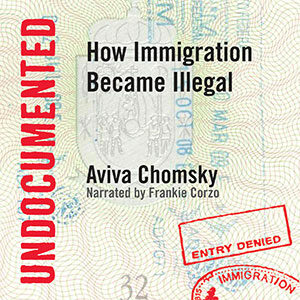Share
This survey has for goal to discover what led exchange students to feel integrated in their host country. My focus will be on exchanges that were made during or right after high school as it is a period of uncertainties and doubts but also a period of growth and transformation before properly entering adulthood. It is of common knowledge that learning another language is a big step to face as an exchange student to be integrated in the culture, but some external indicators also play an interesting role in it. In fact, exchange students who felt more integrated in the host country have proven to have risen their self-esteem and their social inclusion skills (Hutteman et al., 2015), and I found interesting to understand what factors might influence this outcome.

We can see here that 94% of the people responding are from Europe with 46,2% coming from Belgium more specifically. We can therefore already imagine that most of those people are likely to speak a Latin or a Germanic language and that we are mostly talking with people who live by the Belgian culture and norms. This is a general question to understand which people were reached.

The population interrogated mostly went on exchange in Europe. We can conclude that there was not too much of a cultural shock for most of those people hence the integration could have been easier for some of them. For those who went abroad Oceania, Africa or Asia, we imagine that the integration must have taken a longer time as well as learning the language. The North and South of America come almost equally in second place. The main languages of those countries both have Germanic or Latin roots so it might be easier, for those coming from Europe to learn the country’s language.
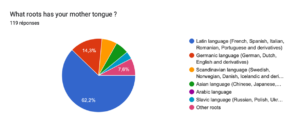
The main languages spoken have Latin roots with a second spot for Germanic languages. The other responses are divided between Scandinavian languages, Asian languages and Slavic languages. The other rooted languages come in third place but when you detail them, those being four Latvians with Baltic roots, two Turkish people, two Finnish people, one person speaking Tamil, one Hungarian, one Faroese, and one person who grew up bilingual with Dutch and Swedish in the Netherlands, those two languages being its mother tongues, we come to the realization that they do not represent one of the major roots of the languages. We have no representation of the Arabic language.
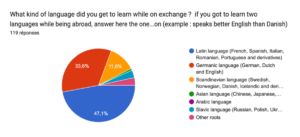
People mainly learned Germanic and Latin languages, but this is logical when we look at the previous graph on where people went on exchange. Scandinavian languages come in third place. Some other rooted languages were mentioned such as Latvian, Finnish, Finno-Ugrian or Polynesian root with the Te Reo Maori language or the Austronesian. On second languages learnt, we find namely Latin languages such as French, Spanish or Catalan, Scandinavian roots like Icelandic or Danish, some English and one person learnt Guarani, an indigenous language from South of America.

We can see that on a scale from “very easy” as the number “1” to “very hard” as the number “6”, people mainly found at almost equal parts that learning this first language was between “2” and “4”. When looked in details, I have noticed that people learning from Germanic languages to Latin languages have had a harder time learning it than people studying Latin language to Latin language for instance, which is logical as those languages do not follow the same rules. This is an interesting observation that we will link later with the integration matter. Here we still suppose that having an easier time embracing the language makes it easier to integrate the culture and norms.
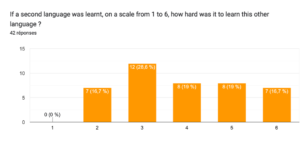
Here, the tendencies are leaning on the highest part of the numbers. When looking at the second languages that have been learnt, we can imagine that learning a second language is often about languages that are rarely spoken outside of the country, and sometimes, dialects. For countries such as Denmark or Iceland, nationals’ level of English is often a high, making it harder for people to learn the official language of the country. Seeing the results, we can observe that acquiring a second language is considered harder than learning the first one.
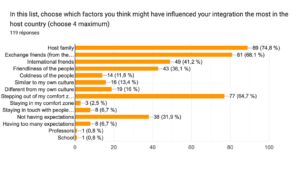
The host family clearly facilitate the most the integration as a high school exchange student. The other main roles are divided between exchange friends from the host country and “stepping out of my comfort zone”, which clearly stress the fact that to integrate better, socialization stays the better option. In order to do so, languages should still be the best tool to realize that. International friends, the friendliness of people from the host country and not having expectations also seem like main factors to favorize the integration of an exchange student. Surprisingly, the fact that the host culture is different than one’s home culture than if the culture is similar has higher percent.
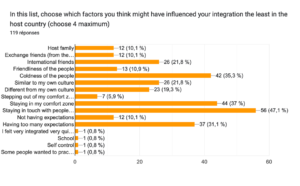
What we can clearly take out from this question is that staying in touch with people back home refrain exchange students from being fully integrated. Staying in its comfort zone, the coldness of the population of the host country and having too many expectations are the three following factors which prevent exchange students to be integrated. So, we might conclude that not putting yourself out there is a step back in integrating in a new country.

This question was asked in order to see if the less time you spend in a country, the less integrated you are. But the vast majority of the people answering the survey have gone on exchange for about a year, and as I was looking in details the answers, I realized duration of the stay does not have a big influence on how integrated you are in a country.

In the middle of the exchange, people mostly felt integrated on a 3 out of 5 on a scale as one being “not at all” and 5 being “very much”. Seeing all the factors we have previously analyzed; we can conclude that nor the language nor the integrating factors are fully mastered by the time they are in the middle of their exchange. But for the people who have same rooted mother tongue and learnt language, or for people who have abilities at stepping out of their comfort zone and being social with friends or family, integration has happened quicker than for the rest.

For this last closed question, we can see that by the time they are at the end of their exchange, almost half of the respondents are feeling fully integrated in their host country. Almost 40% feel practically fully integrated and only 10% have some restrictions about being integrated which is very positive considering how stressful exchanges can be. We can see that 106 people out of 119 feel completely or almost completely part of their host country.
When asked this open question, “Why did you feel (or not) integrated in your host country?”, some of the former exchange students responded many different answers that can be linked with the previous analysis. Answers such as “I spent most of my time with international people, not locals. Everyone spoke to me English because I looked foreign and treated me as a tourist for the whole year » can be refered to the “coldness of the people”, the comments : “My host family actually made me feel like I belong ;)” ; “I was feeling part of the family and I had the chance to be included in a group of friends from my school. Moreover I was also part of the sport team of my community” ; “My host family and school friends helped a lot. They integrates me in everything. Especially my host family, they were amazing taking me everywhere with them and including me in all regular activities” ; “Just knowing the language and culture helped “; “Able to speak the language and have a good host family.” ; “I was thinking In the host country language and taking part in traditional activities.” put in the first place as integration factors mastering the language and having good relations with friends or host family.
This next comment is a good representation of the differences of feelings between integration factors and factors that are playing in integrating less a person : “in my first host family, they were acting with me like if I was a person medal. Because of the pore country, saying that you have an international student in your house is something really good. But in reality they didn’t care about me they just wanted to have me in the house. They like the idea of the European . I called that the international privilege. They also wanted to speak English with me all the time it was really boring I was feeling frustrate . After that I changed my host family. The mom was really considering me as her daughter. It was really funny because she was black and I am white but people thought that she was my mom . Also she was always really patient with me when I called and spoke, she always wanted me to understand what she said. I also felt integrate when I went to the church because at the beginning she thought I was going to think it was boring, but it was really important for her and after she proposed to me to go with her and I could feel that she was considering me like in her real family”.
One comment refers to the length of stay “cause 3 months are not long enough to get really close to people, especially when you don’t speak the language » and it might be an argument that restrain that person from being integrated.
Stepping out of their comfort zone and try to integrate the culture can be seen with this comment : “Native people (from the host country) are usually not used to meet people from others continents and likes to remind you all the time: « you know here we do things this way or that way ». My strong accent made it harder to get integrated too. But being open minded and willing to learn somebody else’s culture was the best thing I could do to be integrated. It is important to not judge what the others are doing and to adapt yourself to their culture. (Try to do the same things as them). »
Those two comments refer to the hidden norms that can still have a hold on the integration of a person : “The feeling of integration wasn’t complete and it depended on the situation. Some aspects of the culture remain unknown and it can play a big part in the integration. Observing, trying to understand and adopting some parts of the culture are probably important to feel integrated, at least from point of view.” ; “At the end it felt like a new home and life that i was about to leave so it does feel like I was integrated even tho i think it’s hard to feel entirely integrated when you don’t fully speak the host language but my close host family always made me feel at home, but it was hard to integrate in other spheres of iceland because people were a bit unapproachable”.
Overall, in their written experience, we can see that many of the factors that were mentioned beforehand and the language skills play the principal roles of integration as a high school exchange student, so the survey can be taken as legitimate. We also must take into consideration that the list of factors that integrate or not an exchange student is not exhaustive and far from being complete. However, it can be considered as a first approach to the integration of high school exchange students.

